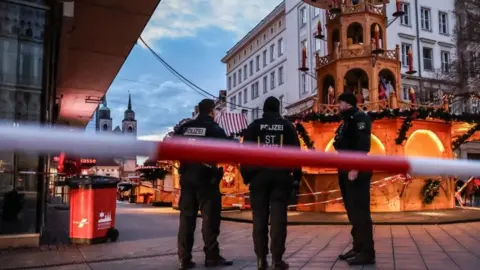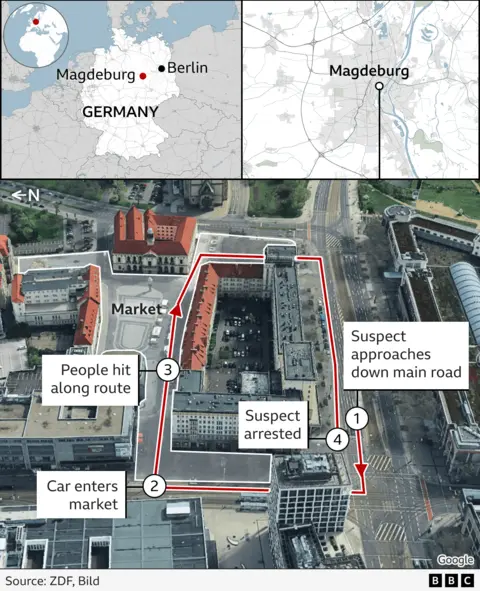Police investigate security and warnings

 EPA
EPAGerman authorities are facing questions about security and what they knew about a suspect accused of using an emergency lane to enter a Christmas market in Magdeburg, killing five people and injuring more than 200.
During his visit on Saturday, German Chancellor Olaf Scholz, ministers and regional political leaders were mobbed by members of the public, some apparently angry at what has been criticized as a lack of security.
German authorities have protected the structure and safety of the market.
The authorities are also asking questions after the reports they were warned about last year the suspectas the police say they have checked whether the suspect might be dangerous a year ago.
The suspect still has it they were ordered to be detained before the trial for murder, attempted murder and grievous bodily harm.
Usually at this time of year, German city centers are full of shoppers and revelers drinking mulled wine, but this year the situation is very different.
The massive Christmas market was cordoned off and surrounded by police vans as armed police patrolled nearby shops and malls.
There is sadness in the air in Magdeburg, there is also bewilderment and anger, as people ask how this could happen.
When Scholz and his colleagues came out of the closed market during their visit on Saturday, they were met with laughter and shouts of “hau ab”, which is a more cruel way of saying “laugh”.
Some people seemed upset by the lack of security. Others appeared irritated and generally irritated by Germany’s political leaders.
Security has been tightened at Christmas markets across Germany since a similar incident in Berlin in 2016 when a man drove a truck into a crowd at a market, killing 12 people.
Open-plan Christmas markets now have some sort of barrier around them – usually large concrete blocks, which is the case in Magdeburg.
However, the gap in these barriers was large enough to allow emergency vehicles to pass.
City manager Ronni Krug told reporters at a press conference on Saturday that emergency services need an exit route in the event of a “normal” emergency, and all relevant agencies agreed to the plan.
“The concept of safety and security must, on the one hand, protect those who visit the event as much as possible, but you also need to ensure, at the same time, if something happens, they are able to leave the site safely and quickly”, he said.
“Maybe it’s something that couldn’t be prevented,” he added.
German media reported that before the attack, there were warnings that the suspect might be a threat.
The suspect, a doctor from Saudi Arabia named Taleb al-Abdulmohsen, came to Germany in 2006 and in 2016 was recognized as a refugee.
An atheist, he ran a website that aimed to help other ex-Muslims flee persecution in their Gulf homelands. His social media was full of anti-Islamic sentiments and conspiracy theories.
At a press conference on Saturday, Magdeburg police chief, Tom-Oliver Langhans, said that the police had conducted an investigation into whether the suspect could be dangerous, “but that discussion was last year”.
He went on to say that the investigation into the suspect’s passing is still ongoing, and declined to comment further.
One of those tipped off is believed to be from Saudi Arabia, the suspect’s country of origin.
A source close to the Saudi government told the BBC it had sent four official notices known as “Notes Verbal” to German authorities, warning of what it said were “extremist views” held by al-Abdulmohsen.
However, a counter-terrorism expert told the BBC that the Saudis may be mounting a disinformation campaign to discredit someone who tried to help young Saudi women seek asylum in Germany.
On Saturday, Langhans said he had no information when asked about Saudi Arabia issuing warnings.
Later, the head of the Federal Criminal Police Office (BKA), Holger Münch, told public broadcaster ZDF that his office received a notification from Saudi Arabia in November 2023. He said that the local police are taking appropriate investigative steps, but the matter is unclear.
He went on to say that the suspect “has been communicating with various authorities, cursing them and even threatening them, but he is not known for acts of violence”.
Previous investigations will need to be reviewed, Münch said.
Social media is under scrutiny
The suspect’s social media is being closely watched as investigators are building their case against him.
He was a poster of anti-Islamic sentiments and conspiracy theories on X, and had made threats in the past.
The German ambassador to the UK said X owner Elon Musk has questions to answer about why his platform did not take action against al-Abdulmohsen.
“We saw that the man who carried out this terrible attack was very busy, threatening X. The question is, ‘does X do something about these things?’,” Ambassador Miguel Berger told BBC Radio 4’s Broadcasting House program on Sunday.
“We have a Digital Security Act in the European Union that requires social media to work […]. It hasn’t happened yet,” he said.
Musk’s account called for Scholz’s resignation, and he retweeted several accounts that were highly critical of the German government for failing to act on the suspect’s social media threats.
The BBC has contacted X for a response.
Musk’s criticism of the German authorities goes beyond the Magdeburg attack. The morning before the attack, he wrote in support of the far-right Alternative for Germany (AfD) political party.
“Only the AfD can save Germany,” he said.
The party’s leader, Alice Weidel, thanked Musk for his “note” and said “the Alternative for Germany is the only and only option for our country; our last option,” in a post retweeted by Musk.
When asked by the BBC to comment on Musk telling Germans how to vote, Berger said: “I think that Elon Musk – before giving German citizens unwanted advice – should look at the responsibility of his platform”.

Source link




